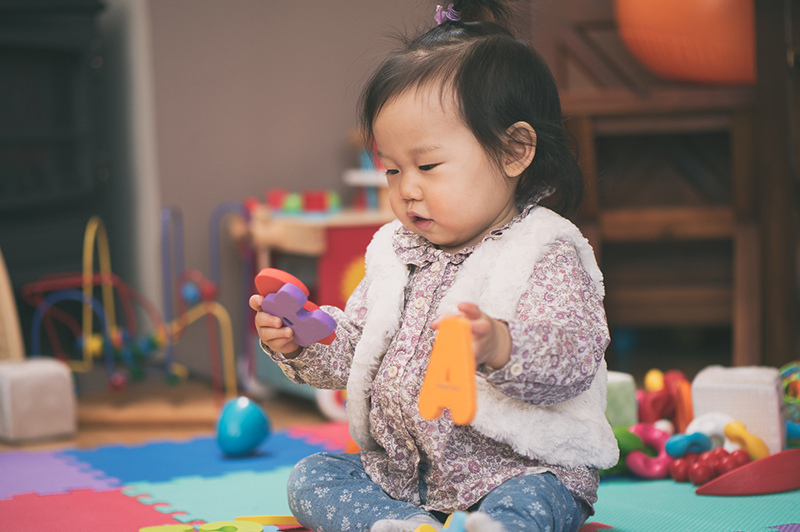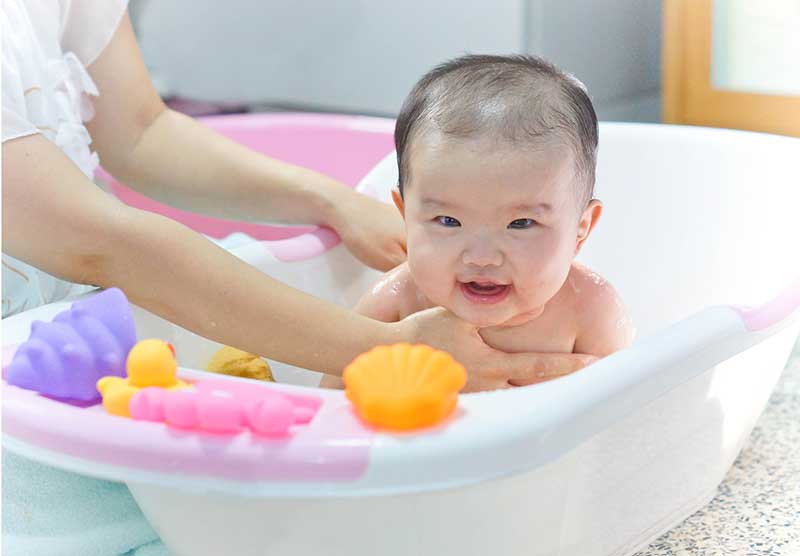Families For Life | 12-15 Months: Toddler Development

Toddlers come in all shapes and sizes, but toddler development at 12-15 months typically has a few things in common. Here’s what your toddler might be doing, how you can help and when to see a child health professional.
Toddler development at 12-15 months: what’s happening
Behaviour, play and feelings
Your toddler spends a lot of time working out what different things do and what they can do with them. For example, your toddler might build small towers of blocks and knock them down, scribble with a pencil or crayon, and drop pegs into a basket.
Toddlers love exploring. If you’re around while your toddler explores, you can give them reassurance, particularly in unfamiliar situations. This can help your toddler feel safe and confident to try new things.
Feelings
This is also an important time for your toddler socially and emotionally. You might notice your toddler playing alongside other children now.
Your toddler will be affectionate towards you and other familiar people and might show signs of separation anxiety.
Your toddler also starts to show empathy. For example, they might look sad or get upset when they see someone else crying. Empathy is about understanding how others are feeling, and it’s an important part of forming relationships with people.
Communicating and talking
At this age, your toddler’s language development matures. Your toddler’s babbling starts to include real words. And your toddler might name familiar objects – for example, a ball. But it’s not all words just yet – your toddler still grunts, nods and points to let you know what they want or to share their interests with you.
Movement
Being active helps builds your toddler’s muscle strength for more complex movements like standing, walking and running.
Your toddler might stand up without needing help from you or the furniture in these months and might start to walk on their own. As your toddler gets better at walking, they might climb stairs or even the furniture.
But if your toddler isn’t walking on their own yet, it helps to know that some children don’t walk without help until 15-18 months.
At this age your toddler might also:
hug you
point to body parts or a favourite toy when you name them
drink from a cup – probably with some spills! – and use a spoon
follow simple instructions – for example, ‘Please give me the block’
try to help when you’re putting on their clothes, often by holding out their arms for sleeves or putting their foot up for shoes
hold a crayon and possibly scribble with it after you show them how
Helping toddler development at 12-15 months
Here are a few simple things you can do to help your toddler’s development at this age:
Give your toddler lots of hugs, cuddles and kisses: empathy and positive attention are good for your child’s emotional development. But don’t expect your toddler to show empathy to you all the time. Your toddler still learning how their emotions work, and how to get along with others.
Playing is an important way for your toddler to find out how things work, so make time for both indoor and outdoor play. Open-ended toys are great for play – try blocks, pegs, cups of water, ice-cream containers and cardboard boxes. Your toddler will also still love playing games with you, like pat-a-cake or peekaboo.
Talk with your toddler: naming and talking about everyday things – body parts, toys and household items like spoons or chairs – helps develop your toddler’s language skills. At this age, you can teach your toddler that a ‘chair’ can be a ‘big chair’, ‘red chair’ or even a ‘big red chair’.
Build your toddler’s talking and communication skills by listening and talking back. You can copy what your toddler says – for example, if your toddler says ‘mama’, you say ‘mama’. This encourages two-way conversation and also makes your toddler feel valued and loved.
Read with your toddler: you can encourage your toddler’s talking and imagination by reading together, telling stories, singing songs and reciting nursery rhymes.
Encourage your toddler's everyday skills like feeding themsleves, drinking from a cup and taking off a hat. These skills involve both small and big muscle movements, as well as the ability to think about what they're doing.
Encourage moving: this build's your toddler's muscle strength, which is important for more complex movements like walking and running. Making your home safe means your active toddler move about without getting hurt.
Parenting a toddler at 12-15 months
Every day you and your toddler will learn a little more about each other. As your toddler grows and develops, you’ll learn more about what he needs and how you can meet these needs.
In fact, as a parent, you’re always learning. Every parent makes mistakes and learns through experience. It’s OK to feel confident about what you know. And it’s also OK to admit you don’t know and ask questions – often the ‘dumb’ questions are the best kind!
Your own physical and mental health is an important part of being a parent. But with all the focus on looking after a child, lots of parents forget or run out of time to look after themselves. Looking after yourself will help you with the understanding, patience, imagination and energy you need to be a parent.
Sometimes you might feel frustrated or upset. But if you feel overwhelmed, put your child in a safe place – for example, a cot – or ask someone else to hold her for a while. Take some time out until you feel calmer. You could also try going to another room to breathe deeply or calling a family member or friend to talk things through.
Never shake a toddler. It can cause bleeding inside the brain and likely permanent brain damage.
It’s OK to ask for help. If you’re feeling overwhelmed by your toddler, talk to your spouse, a family member, friends or seek professional help.
When to be concerned about toddler development
See your paediatrician or General Practitioner (GP) if you have any concerns or notice that at 12-15 months your toddler has any of the following issues.
Seeing, hearing and communicating
Your toddler:
isn’t making eye contact with you,
isn’t following moving objects with their eyes
has an eye that is turned in or out most of the time
isn’t interested in sounds
doesn’t respond to their name
isn’t babbling or using single words
isn’t trying to let you know what they want
isn’t using gestures like waving or pointing.
Behaviour, play and feelings
Your toddler:
doesn’t seem to understand you
isn’t showing emotions and feelings.
Movement and motor skills
Your toddler:
can’t stand even when by holding on to you or the furniture
uses one hand a lot more than the other.
You should see a child health professional if you notice that your child has lost skills he had before.
You should also see your paediatrician or General Practitioner if you notice the signs of postnatal depression in women or postnatal depression in men in yourself or your spouse. Symptoms of postnatal depression include feeling sad and crying for no obvious reason, feeling irritable, having difficulty coping and feeling very anxious.
Children grow and develop at different speeds. If you’re worried about whether your child’s development is ‘normal’, it might help to know that ‘normal’ varies a lot. But if you still feel that something isn’t quite right, see your paediatrician or General Practitioner.
Video: Language Development: Tips and Milestones
Watch this video and learn the importance of communicating with your baby, and how it helps her learn language.
Video: Skills Learnt Through Play
Watch this video and learn tips on how to guide your little one through play.
© raisingchildren.net.au, translated and adapted with permission
Explore more

DID YOU KNOW?
Bath time is a good way to soothe your baby but it can also be a fantastic learning opportunity for your child. Learn how you can engage him during bath time..
READ MORE